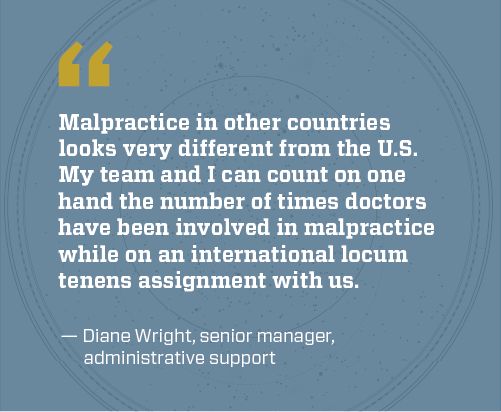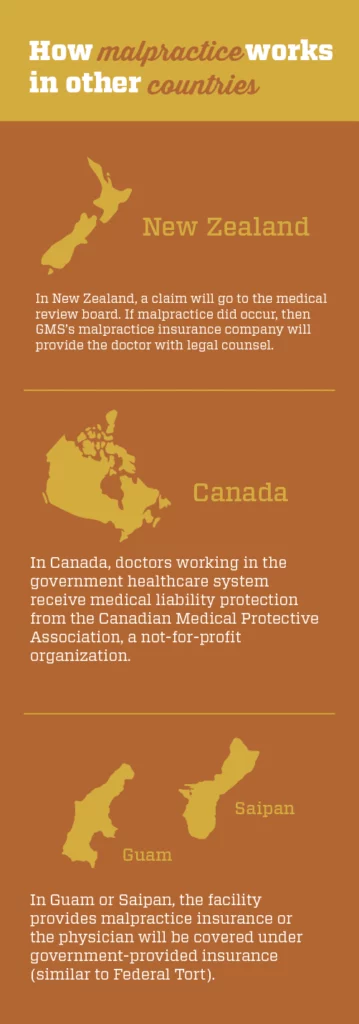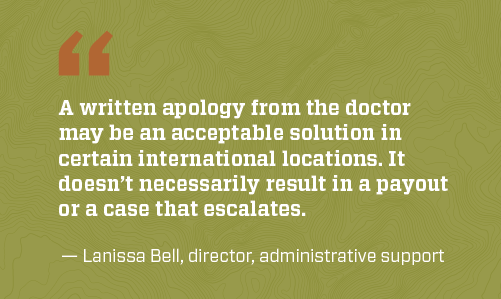
Medical malpractice is handled differently outside the U.S. For instance in other countries, damages often have caps, judges determine cases instead of a jury, and some countries don’t take cases to court at all. Instead, they go to the medical review board. Here’s an in-depth look at how malpractice works in some of the other countries where Global Medical Staffing place physicians as international locum tenens, and what you need to know about malpractice when taking an international assignment.
Malpractice in the U.S.
Malpractice is fairly common. Nearly one-third of physicians have been named in a medical malpractice lawsuit, according to the American Medical Association. Almost half of those sued have been named in more than one lawsuit. Of those sued, 88% felt that the suit was unwarranted.
One big takeaway from these stats is that the U.S. is a litigious place.
“Nobody is as hospitable to potential liability as we are in this country,” said Richard A. Epstein, director of the law and economics program at the University of Chicago Law School in an article for American Medical News.
Malpractice internationally

“Malpractice in other countries looks very different from the U.S.,” says Diane Wright, senior manager of the Global Medical Staffing administrative support team. “My team and I can count on one hand the number of times doctors have been involved in malpractice while on an international locum tenens assignment with us.”
This is despite the thousands of doctors we’ve placed in international assignments in our nearly 30 years.
“When malpractice happens overseas, it’s not as frequent. Maybe a doctor made a mistake during a C-section or other procedure and they may face a suit, but the suit will look different than it does in the U.S.,” Wright says.
If one of our international physicians does get involved in a malpractice lawsuit, both Global Medical and the healthcare facility where they were assigned will work with them and support them through the process.

How malpractice is different in other countries than in the United States
“Malpractice is different depending on the country, from Canada to Australia to New Zealand,” Wright says. “It also looks different by the type of locums contract a doctor has.”
That said, here are some basic facts about malpractice in countries where we commonly place physicians:
Judges vs. juries
In most of Europe and in Canada for example, such issues are decided by judges, reports American Medical News. This tends to mean that payouts are smaller, the case is resolved in less time (months instead of years), and there is less drama and adversary in the process than in the U.S.
Caps on damages
For instance, Canada has a maximum compensation set at about $360,000, no matter how catastrophic the damage might have been. Compare that to the U.S.: in 2023, there have been multiple jury awards of over $25 million.
The U.K. has now introduced legislation to cap the amount of pain and suffering damages judges can award at around $31,000 (USD).
Responsibility for legal fees
“Canada, Europe, and Australia also make the loser bear the other side’s legal fees, which has been credited with discouraging frivolous litigation, according to the Manhattan Institute study,” says American Medical News.
Medical board review
In some countries, like New Zealand, a malpractice claim goes to the medical board to review, which determines if a medical error was avoidable and if compensation is warranted. Damages are decided according to a pre-set schedule based on the type of injury. “New Zealand has a government-funded compensation system, called the Accident Compensation Corporation, which covers the cost of all accident injuries, including those caused by medical malpractice,” according to the Center for Justice and Democracy

“In New Zealand, for example, a ‘malpractice’ complaint could be something as simple as a patient reporting to the medical board that he/she has had a negative experience with a doctor. Then the board will reach out to the place of employment. In a case like this, a written apology from the doctor may be an acceptable solution; it doesn’t necessarily result in a payout or a case that escalates,” says Lanissa Bell, director, administrative support at GMS.
Interested in international locums? Here’s how you can make it happen
Your international locum tenens contract usually covers malpractice insurance
In Canada, doctors working for the government healthcare system, including locums physicians, receive medical liability protection from the Canadian Medical Protective Association (CMPA), a not-for-profit organization that doctors join. Some healthcare providers work in private practices that bill the government for services. That office/facility usually has its own medical liability insurance, which is often covered as part of the contract. Talk to your GMS recruiter to find out what the case is for your contract.
In the U.K., the National Health Service handles malpractice coverage, claims against, and payouts for medical malpractice against NHS healthcare providers, as it’s usually the NHS that is sued, not individual physicians. Depending on the locums contract, for private practice and sometimes for NHS, malpractice might be covered through a specific insurance policy. Look into this with your rep based on the specific contract.
In Australia, “an Australian plaintiff can sue individual medical practitioners, as well as employers of these negligent professionals if the patient and his or her legal solicitor present a credible case of failure to provide medical services at a reasonable standard of care,” reports the Medical Malpractice Center. Often, malpractice insurance is covered in the locums contract when working in Australia. Again, look into it with your rep.
Wright also notes, “in New Zealand, we typically obtain malpractice coverage on behalf of the healthcare client and the physician.”
How claims are handled
If a claim is filed in the U.K., the hospital/clinic will be notified first, and then the physician. Depending on the contract, the NHS or insurance company will represent the doctor.
In Canada, at a private facility, the physician can seek their own legal counsel with the help of their healthcare facility. This legal counsel is usually covered by the malpractice insurance policy. If the physician is working as part of the government system and is a member of the CMPA, the physician will receive free legal counsel from the CMPA.
In New Zealand, a claim will go to the medical review board. The medical board will reach out to the place of employment. If malpractice likely did occur, then our malpractice insurance company will provide the doctor with legal counsel.
In Australia, in the event of a malpractice claim, the healthcare client will be notified, then the doctor.
What happens when a malpractice claim is filed?
If a case is filed against one of our physicians on an international assignment and the case begins to progress, the malpractice insurance will cover the cost of a lawyer and any payout. The hospital, malpractice insurance company, and our staff can help a physician find a good attorney.
“It typically starts with arbitration or mediation in any of the international countries where we place physicians,” Wright says. “And if it progresses, it could go to court.”
In the U.S., we cover malpractice insurance for our physicians, so we hold the policy and communicate with the attorney.
“Internationally, we don’t hold the policy, so we can’t talk on behalf of the doctor to the lawyer, which means we may not be able to provide as much support, but we will provide as much support as we can,” Wright says.
What malpractice means as far as being eligible for international locum tenens assignments
Having a malpractice case filed against you in the U.S. or internationally does not necessarily disqualify you from taking international locums assignments.
“The doctor could go through a malpractice suit and, if it makes a payout, would be looked at on a case-by-case basis,” says Wright.
The good news is that getting sued for malpractice is far less common internationally than in the U.S. Physicians on international assignments can feel more free to practice medicine as intended, as opposed to practicing defensively.
Have additional questions about international malpractice? Give us a call at 866.858.6269.



 Back
Back